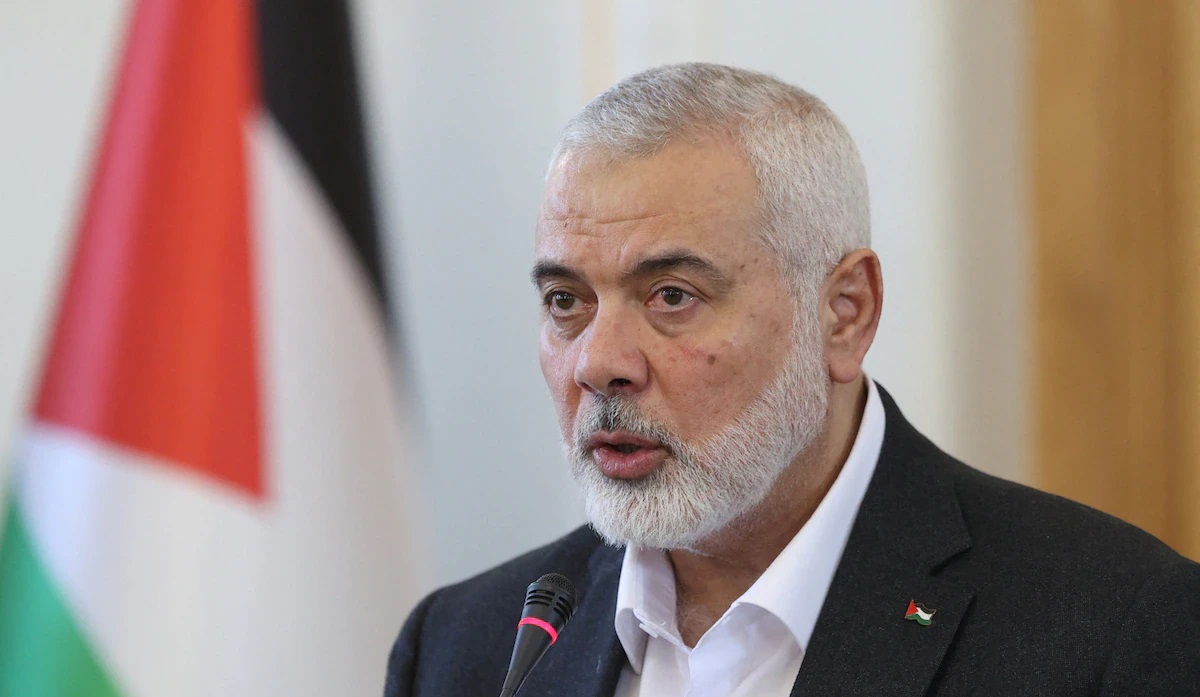 Hamas chief Ismail Haniyeh and one of his bodyguards were killed after their residence was targeted in Iran, the Palestinian group said in a statement today.
Hamas chief Ismail Haniyeh and one of his bodyguards were killed after their residence was targeted in Iran, the Palestinian group said in a statement today.
Hamas said Ismail Haniyeh was killed in “a treacherous Zionist raid on his residence in Tehran” Tuesday morning. The group said an investigation is on to find out more details about the attack.
Haniyeh was in the Iranian capital to attend the swearing-in of Iran’s president Masoud Pezeshkian.
“Brother, leader, mujahid Ismail Haniyeh, the head of the movement, died in a Zionist strike on his headquarters in Tehran after he participated in the inauguration of the new (Iranian) president,” the statement read.
Iran’s Revolutionary Guards also confirmed his death, saying Haniyeh’s residence in Tehran was “hit” and he was killed along with a bodyguard.
The Israeli army did not immediately respond to Haniyeh’s killing.
Israel had vowed to kill Ismail Haniyeh and destroy the Hamas group after October 7 attack that resulted in the deaths of 1,195 people, mostly civilians.
Israel’s retaliatory military campaign in Gaza has killed at least 39,400 people, according to the health ministry in the Hamas-run territory.
Haniyeh was elected head of the Hamas political bureau in 2017 to succeed Khaled Meshaal. Considered a pragmatist, Haniyeh lived in exile and split his time between Turkey and Qatar.
He had travelled on diplomatic missions to Iran and Turkey during the war, meeting both the Turkish and Iranian presidents.
Haniyeh was said to maintain good relations with the heads of the various Palestinian factions, including rivals to Hamas.
He joined Hamas in 1987 when the militant group was founded amid the outbreak of the first Palestinian intifada, or uprising, against Israeli occupation, which lasted until 1993.
Hamas Chief Ismail Haniyeh Killed In Iran’s Capital, Group Confirms
In a shocking turn of events, Ismail Haniyeh, the chief of the Palestinian Islamist organization Hamas, has been confirmed dead following an incident in Tehran, Iran. This development has sent ripples across the Middle East, with potential implications for the already volatile geopolitical landscape in the region.
Background on Ismail Haniyeh and Hamas
Ismail Haniyeh, a prominent figure within Hamas, has been a key player in the group’s activities and political maneuvers. Hamas, which controls the Gaza Strip, is designated as a terrorist organization by Israel, the United States, the European Union, and several other countries, though it is also recognized as a legitimate resistance movement by many in the Arab and Muslim worlds. Haniyeh has been instrumental in navigating the group through numerous conflicts with Israel and has been a vocal advocate for Palestinian rights and resistance.
The Incident in Tehran
Details surrounding the death of Ismail Haniyeh remain sparse at the moment. Reports from various news outlets indicate that the incident occurred in Tehran, the capital of Iran, where Haniyeh was reportedly attending meetings. Iran has been a long-time supporter of Hamas, providing financial and military support to the group. The exact circumstances of his death have not been fully disclosed, but sources suggest it may have been a targeted attack.
Reactions from Hamas and Iran
The confirmation of Haniyeh’s death was met with immediate statements from Hamas. The group’s spokesperson expressed deep sorrow and vowed to continue Haniyeh’s mission. “The martyrdom of our leader Ismail Haniyeh is a grave loss for the Palestinian cause, but it will not deter our struggle for liberation,” the spokesperson said.
Iranian officials have also condemned the incident, with high-ranking members of the government calling for an investigation into the circumstances of Haniyeh’s death. Supreme Leader Ayatollah Ali Khamenei issued a statement expressing condolences and reiterating Iran’s support for the Palestinian resistance.
Regional and International Implications
Haniyeh’s death is likely to have significant repercussions in the region. Hamas has a robust leadership structure, but Haniyeh’s experience and leadership were pivotal in the group’s strategies and operations. The loss of such a key figure may lead to a temporary power vacuum within Hamas, potentially causing internal struggles for succession.
For Israel, Haniyeh’s death could mean a temporary disruption in Hamas’ operational capabilities, but it also raises concerns about possible retaliatory attacks. Israeli security forces have been placed on high alert, anticipating potential escalations.
Internationally, the incident could affect the broader dynamics of Middle Eastern geopolitics. Iran’s role and its relationships with other regional players, such as Hezbollah in Lebanon and various militia groups in Iraq and Syria, may see shifts as they react to this development. The U.S. and European countries, which have been involved in diplomatic efforts to mediate peace in the region, will be closely monitoring the situation.
Speculations and Theories
Speculations about who might be responsible for Haniyeh’s death are rife. Some theories suggest the possibility of Israeli involvement, given the historical enmity between Israel and Hamas. However, no concrete evidence has been presented to support this claim, and Israeli officials have not commented on the matter.
Another angle being explored is the potential involvement of rival factions within the Palestinian territories. Hamas has faced opposition from other groups, including Fatah and various Salafi jihadist factions. Internal rivalries and power struggles are not uncommon in such a volatile political environment.
Conclusion
The death of Ismail Haniyeh marks a significant moment in the ongoing conflict between Israel and Palestinian factions. As the region braces for potential fallout, the international community will be watching closely to see how Hamas reorganizes and how this event influences broader Middle Eastern geopolitics. The incident underscores the fragile nature of peace and stability in the region and the ever-present potential for sudden and impactful changes.

















